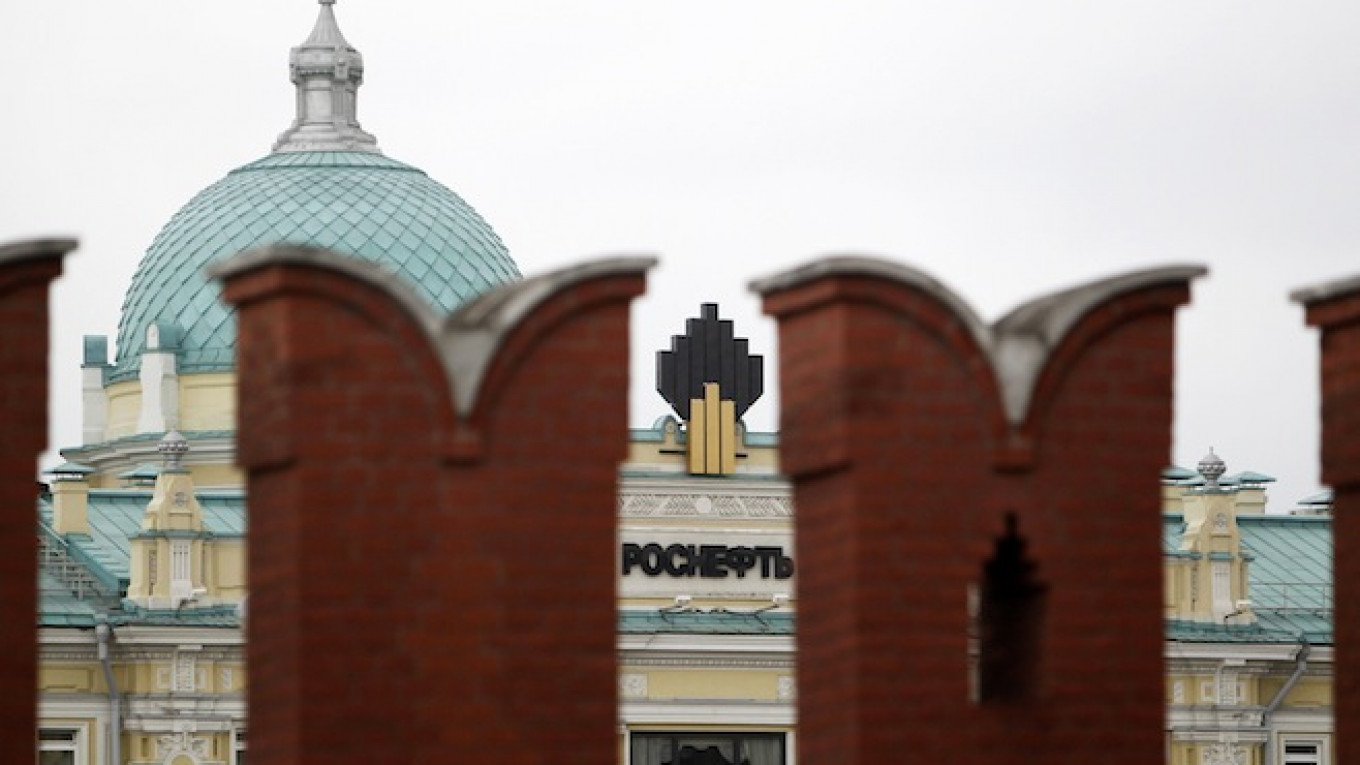Rosneft, Russia's biggest oil producer, has announced it has been seeking ways to cope with the negative impact of international sanctions, as it reported higher net income helped by a stronger ruble.
Kremlin-controlled Rosneft, which accounts for 40 percent of Russian oil production, was hit by U.S. sanctions over Moscow's actions in Ukraine, limiting the company's access to Western money.
Cooperation with international peers is important to Rosneft, 19.75 percent of whose shares are owned by BP. ExxonMobil also has a number of joint projects with Rosneft.
Chief Executive Officer Igor Sechin, a longstanding ally of President Vladimir Putin, said the company has been working on a plan to offset the negative effect of the punitive measures.
"Together with our partners — the world's leading oil companies — we are working on a plan to minimize the consequences of including Rosneft on the sanction lists," Sechin said Friday in the statement.
Svyatoslav Slavinsky, in charge of Rosneft's finances, told a conference call that the company does not expect any changes to its joint projects with international majors.
"Speaking about our forward plans regarding our cooperation with our partners, there have been no changes, everything has been done and [funding] is on track. … We should not expect any major changes," he said through an interpreter.
The head of Norway's Statoil, with which Rosneft has plans to jointly develop Russia's Arctic offshore riches and hard-to-recover oil, said it has been studying the sanctions that have been implemented, but there has been no change in their cooperation.
However, Russian companies, including Rosneft, are facing tougher sanctions from the European Union as the deepest East-West spat since the end of the Cold War two decades ago flares.
The new round of punitive measures, following the downing of a Malaysian plane with 298 people on board over Ukraine in a pro-Moscow rebel-held province, may include a ban on exporting oil and gas producing equipment to Russia.
Profit Up
Rosneft said its net income in the second quarter — before the sanctions were introduced — surged by almost five times year-on-year to 172 billion rubles ($4.9 billion), beating analyst forecasts, due to a stronger ruble.
Rosneft reports in rubles and the stronger currency has a positive impact on its huge foreign currency-denominated debt.
Analysts, polled by Reuters, had expected April-June net income at 161 billion rubles ($4.5 billion). Excluding the foreign exchange effect, net income increased 88 percent year-on-year.
Rosneft's shares were down 0.7 percent in late afternoon trade, outperforming a 1.4 percent decline of the broader Moscow market.
The company said its earnings before interest, taxation, depreciation and amortization, or EBITDA, rose to 304 billion rubles ($8.6 billion), almost in line with expectations.
Sales for the period rose to 1.44 trillion rubles ($41 billion), slightly above the 1.42 trillion rubles ($40.4 billion) expected by analysts. Rosneft reported it received $1.9 billion of advanced payments from BP in July under a five-year oil supply deal.
Free cash flow surged to 112 billion rubles ($3.1 billion) while net debt declined to 1.495 trillion rubles (42.5 billion).
See also:
Exxon Oil Rig Tests Russian Waters and U.S. Sanctions
Moody's: Russia Sanctions Hamper Rosneft, Gazprom Debt Refinancing
A Message from The Moscow Times:
Dear readers,
We are facing unprecedented challenges. Russia's Prosecutor General's Office has designated The Moscow Times as an "undesirable" organization, criminalizing our work and putting our staff at risk of prosecution. This follows our earlier unjust labeling as a "foreign agent."
These actions are direct attempts to silence independent journalism in Russia. The authorities claim our work "discredits the decisions of the Russian leadership." We see things differently: we strive to provide accurate, unbiased reporting on Russia.
We, the journalists of The Moscow Times, refuse to be silenced. But to continue our work, we need your help.
Your support, no matter how small, makes a world of difference. If you can, please support us monthly starting from just $2. It's quick to set up, and every contribution makes a significant impact.
By supporting The Moscow Times, you're defending open, independent journalism in the face of repression. Thank you for standing with us.
Remind me later.






